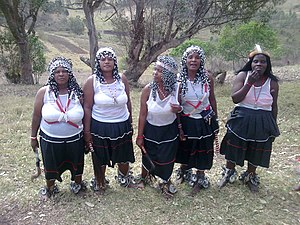 Global Information
Global InformationTraditional healers of Southern Africa information

Traditional healers of Southern Africa are practitioners of traditional African medicine in Southern Africa. They fulfill different social and political roles in the community like divination, healing physical, emotional, and spiritual illnesses, directing birth or death rituals, finding lost cattle, protecting warriors, counteracting witchcraft and narrating the history, cosmology, and concepts of their tradition.
There are two main types of traditional healers within the Nguni, Sotho-Tswana, and Tsonga societies of Southern Africa: the diviner (isangoma) and the herbalist (inyanga). These healers are effectively South African shamans who are highly revered and respected in a society where illness is thought to be caused by witchcraft, pollution (contact with impure objects or occurrences) or through neglect of the ancestors.[1][2] It is estimated that there are as many as 200,000 traditional healers in South Africa compared to 25,000 doctors trained in bio-medical practice.[3] Traditional healers are consulted by approximately 60% of the South African population, usually in conjunction with modern biomedical services.[4] For harmony between the living and the dead, vital for a trouble-free life, traditional healers believe that the ancestors must be shown respect through ritual and animal sacrifice.[5] They perform summoning rituals by burning plants like impepho (Helichrysum petiolare), dancing, chanting, channeling or playing drums.
Traditional healers will often give their patients muthi—medications made from plant, animal and minerals—imbued with spiritual significance. These muthi often have powerful symbolism; for example, lion fat might be prepared for children to promote courage. There are medicines for everything from physical and mental illness, social disharmony and spiritual difficulties to potions for protection, love and luck.
Although sangoma is a Zulu term that is colloquially used to describe all types of Southern African traditional healers, there are differences between practices: an inyanga is concerned mainly with medicines made from plants and animals, while a sangoma relies primarily on divination for healing purposes and might also be considered a type of fortune teller. A trainee sangoma (or ithwasane) starts his Ukuthwasa or ubungoma (in Xhosa) journey which is associated with the "calling" to become a sangoma, though this event also involves those with schizophrenia. A similar term, Amafufunyana refers to claims of demonic possession due to members of the Xhosa people exhibiting aberrant behaviour and psychological concerns.[6] After study, it was discovered that this term is directed toward people with varying types of schizophrenia.[6]
In modern times, colonialism, urbanisation, apartheid and transculturation have blurred the distinction between the two and traditional healers tend to practice both arts.[4][7][8][9] Traditional healers can alternate between these roles by diagnosing common illnesses, selling and dispensing remedies for medical complaints, and divining cause and providing solutions to spiritually or socially centred complaints.[10]
Each culture has their own terminology for their traditional healers. Xhosa traditional healers are known as amaxhwele (herbalists) or amagqirha (diviners).[4] Ngaka and selaoli are the terms in Northern Sotho and Southern Sotho respectively, while among the Venda they are called mungome.[3] The Tsonga refer to their healers as n'anga or mungoma.[11]
- ^ Cumes 2004, p. 14.
- ^ Campbell 1998, p. 38.
- ^ a b Truter 2007, p. 56-60.
- ^ a b c van Wyk, van Oudtshoorn & Gericke 1999, p. 10.
- ^ Cumes 2004, p. 10.
- ^ a b Niehaus DJ, Oosthuizen P, Lochner C, Emsley RA, Jordaan E, Mbanga NI, Keyter N, Laurent C, Deleuze JF, Stein DJ (March–April 2004). "A culture-bound syndrome 'amafufunyana' and a culture-specific event 'ukuthwasa': differentiated by a family history of schizophrenia and other psychiatric disorders". Psychopathology. 37 (2). Karger Publishers: 59–63. doi:10.1159/000077579. PMID 15057028. S2CID 23545601.
- ^ Richter 2003, p. 8.
- ^ Liebhammer 2007, p. 196.
- ^ Pretorius, Engela (1999). Crisp, Nicholas; Ntuli, Antoinette (eds.). SAHR 1999. Durban: Health Systems Trust. pp. 249–257. ISBN 978-1-919743-53-0.
- ^ Hunter (1936). The Function of Diviners. Archived from the original on 15 February 2014.
- ^ Liebhammer 2007, p. 171-174.